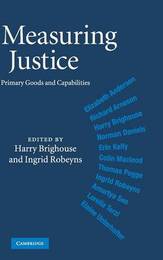
|
Measuring Justice: Primary Goods and Capabilities
Hardback
Main Details
| Title |
Measuring Justice: Primary Goods and Capabilities
|
| Authors and Contributors |
Edited by Harry Brighouse
|
|
Edited by Ingrid Robeyns
|
| Physical Properties |
| Format:Hardback | | Pages:268 | | Dimensions(mm): Height 229,Width 152 |
|
| Category/Genre | Social and political philosophy |
|---|
| ISBN/Barcode |
9780521884518
|
| Classifications | Dewey:320.011 |
|---|
| Audience | | Professional & Vocational | |
|---|
|
Publishing Details |
| Publisher |
Cambridge University Press
|
| Imprint |
Cambridge University Press
|
| Publication Date |
28 January 2010 |
| Publication Country |
United Kingdom
|
Description
This book brings together a team of leading theorists to address the question 'What is the right measure of justice?' Some contributors, following Amartya Sen and Martha Nussbaum, argue that we should focus on capabilities, or what people are able to do and to be. Others, following John Rawls, argue for focussing on social primary goods, the goods which society produces and which people can use. Still others see both views as incomplete and complementary to one another. Their essays evaluate the two approaches in the light of particular issues of social justice - education, health policy, disability, children, gender justice - and the volume concludes with an essay by Amartya Sen, who originated the capabilities approach.
Author Biography
Harry Brighouse is Professor of Philosophy and Affiliate Professor of Education Policy Studies at the University of Wisconsin, Madison. His previous publications include On Education (2006). He was co-editor for The Political Philosophy of Cosmopolitanism (Cambridge, 2005). Ingrid Robeyns is Professor of Practical Philosophy at the Erasmus University Rotterdam. She was co-editor for Amartya Sen's Work and Ideas: A Gender Perspective (2005).
Reviews'... an excellent collection, which importantly contributes to deepening our understanding of the primary goods and capability approaches, and provides valuable insights for both political theorists and practitioners.' The Journal of Ethics and International Affairs
|